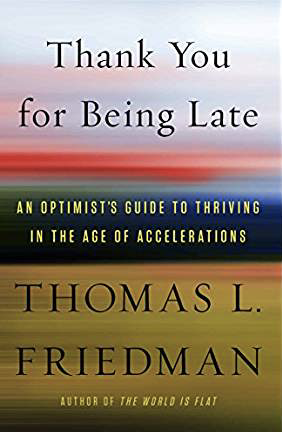Book Review: Thank You for Being Late: An Optimists Guide to Thriving in the Age of Accelerations By *Thomas L. Friedman
Feel like it’s hard to keep up? There is good reason for that and in Friedman’s latest book he explains why and how the world is actually accelerating. And, what do to about it.
This book really engaged me, as it resonates with a lot of what I am about. I am going to share in bullet points some of the content that spoke to me.
- 2007 marks a pivotal point in time where things really changed. That was the year the IPhone, Airbnb, Uber, Facebook, Twitter, Change.org, Kindle, YouTube all came in the mainstream. That is important because they reshaped how people and machines communicate, create, collaborate, and think. (On a side note, I published Spiral Impact that year too!)
- The rate of speed of connection doubles every two years because that is Moore’s Law. Microprocessors double in speed, that speeds everything up.
- “Motivation Divide – The future will belong to those who have the self-motivation to take advantage of all the free and cheap tools…” Marina Gorbis, executive director of the Institute for the Future
- Leon Wiesletier, “Technologist want us to think that patience became a virtue only because in the past “we had no choice” – we had to wait longer for things…now we have made waiting almost obsolete…their attitude is ‘who needs patience anymore. “ However, to the ancients patience wasn’t just about the absence of speed; it was space for reflection and thought…knowledge is only good if you can reflect on it.”
- Stempathy – jobs that require and reward the ability to leverage technical and interpersonal skills.
- Employment grows significantly faster in occupations that use computers more.
- To compete for jobs in the future you need the 4 c’s of creativity, collaboration, communication, and coding.
- Often great employees are missed because they get screened out of our hiring processes.
There is so much to this book. I highly recommend it if you are interested in the future this book provides a historical framework and guidance.
*Thomas Friedman is the author of The World if Flat and New York Times Opinion writer.



Great review Karen. I plan to get this book and read it on my vacation time. Thanks for the suggesting.
Katie
I really love this book!